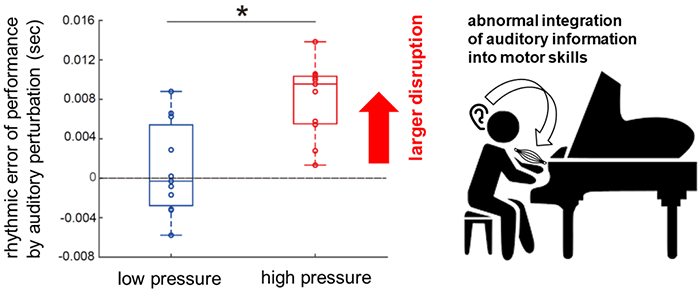Experts such as pianists, athletes, and surgeons acquire their skills through extensive practice. However, the neurophysiological and psychological mechanisms that underlie the problem of making mistakes due to psychological stress remain unexplored in the context of pressured situations such as in piano competitions or the Olympics. Training for preventing such mistakes also remain unexplored, in spite of the fact that they can pose a threat to one’s occupation and career.
Dr. Shinichi Furuya and colleagues from Sony Computer Science Laboratories, Inc., along with Professor Noriko Nagata and Reiko Ishimaru, an alumna, of Kwansei Gakuin University have discovered a training method to prevent degradation of pianists’ fine motor skills due to psychological stress. The research group examined the robustness of the processes that integrate auditory functions that perceive timing and the motor functions that produce accurate finger movements, by transiently delaying the timing of the production of sounds on an electronic piano using a custom-made auditory feedback system that can manipulate the volume and timing of piano sounds, and then evaluating the amount of disruption of the piano performance immediately after the perturbation.
<Research Content>
First, in Experiment 1, by artificially generating rhythmic errors during piano performance, we aimed to clarify how pianists use auditory information to skillfully control the movement of their fingers. While pianists were playing a set piece of music at a specified tempo, we artificially delayed the timing of the production of sounds by 80 milliseconds (a millisecond is one-thousandth of a second) at the moment when the pianist could not predict, and investigated the extent to which the subsequent performance was disrupted. In order to create a situation of augmented psychological stress, another pianist observed and evaluated the performance by standing right next to the pianist who was performing. Further, a video camera was placed in front of the performer so as to record the performance. The experiment was conducted with 11 pianists, and we found a significant decrease in the accuracy of the timing of keystrokes with the presentation of delayed auditory feedback, only during performances in which the pianists were under psychological stress. This reaction is similar to that shown by those who have no experience in music training (i.e. non-musicians) in situations without psychological stress. This indicates that with psychological stress, the abnormally excessive motor disruptions occur in reaction to erroneous information derived from auditory perception of the rhythm. However, such malfunctions associated with psychological pressure were not observed for the auditory function of discriminating between two sounds presented successively and identification of the time interval between them, or the motor function responsible for the speed and accuracy of movement when moving fingers at the fastest speed.
Next, in Experiment 2, we examined effects of auditory-motor training using our auditory feedback system with 30 pianists. The training was conducted for tens of minutes, after which the pianists were asked to perform under psychological stress. The research groups included two training groups with 10 pianists each: one training group that practiced ignoring the delay in the timing of production of sounds during piano performance (delay-ignore group); and one training group that practiced keystrokes with a faster than the normal timing to compensate for the artificial delay of production of sounds (delay-adapt group). In addition, there was another group with 10 pianists (control group) that did not undergo training. Post-training analysis was conducted to examine the disruption of performance (errors in keystroke timing) caused by presentation of delayed auditory feedback under psychological stress We found that only pianists in the delay-ignore group showed no performance disruption under pressure after the training. This suggests that training normalized the pianists’ ability to integrate auditory perception and motion, and thereby pianists could prevent erroneous finger movements in response to erroneous auditory information on the rhythm, even under psychological strain. One of the reasons for this could be that since the delay-ignore group was trained not to respond excessively to abnormal auditory stimuli during performance, the training has normalized the mental and physical functions that had been responding with an excessive degree of sensitivity to mistakes detected by the ear under psychological pressure.
In summary, the deterioration of musical performance due to psychological stress was associated with malfunction of the skills of experts to control movements appropriately using auditory information, which degraded the participants’ performance to the level of a beginner. The study also found that such skill impairment may be prevented by a specialized sensorimotor training.
These findings may assist in the development of new theoretical approaches to training against choking under pressure and training systems for optimal performance under psychological stress, and to elucidate the neuroscientific, physiological, and psychological mechanisms behind problems such as performance anxiety and “the yips” (symptoms of tension and anxiety in which actions that could be performed smoothly in the normal situation cannot be performed as expected).
-

Figure1:Disruption of performance by auditory perturbation and its mechanism Following provision of delayed auditory feedback, the musical performance was disrupted only in the high-stress condition, but not in the low-stress condition. The left figure displays the rhythmic disruption of the piano performance by the perturbation. The right figure displays a schematic drawing of abnormal auditory-motor integration under pressure.
© Sony Computer Science Laboratories, Inc.
Program Information
- JST CREST
- Research Area “Creation and development of core technologies interfacing human and information environments”
- Research Theme “A study on skill acquisition mechanism and development of skill transfer systems”
Journal Information
Shinichi Furuya, Reiko Ishimaru, Takanori Oku and Noriko Nagata, “Back to feedback: aberrant sensorimotor control in music performance under pressure”, Communications Biology. Published online December 16, 2021, doi: 10.1038/s42003-021-02879-4
Contact
-
[About Research]
Shinichi Furuya
Sony Computer Science Laboratories, Inc.
E-mail: furuyacsl.sony.co.jp
Noriko Nagata
Professor, School of Science and Technology, Kwansei Gakuin University
E-mail: nagataofficekwansei.ac.jp
-
[About Program]
Hiroko Tatesawa
Department of Strategic Basic Research, JST
E-mail: crestjst.go.jp
